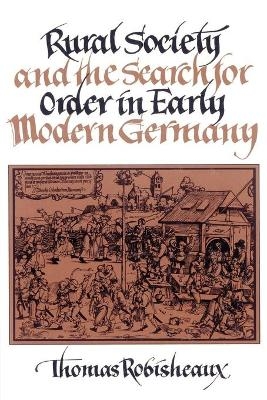
Rural Society and the Search for Order in Early Modern Germany
Seiten
2002
Cambridge University Press (Verlag)
978-0-521-52687-6 (ISBN)
Cambridge University Press (Verlag)
978-0-521-52687-6 (ISBN)
For the rural societies of Germany the early sixteenth century was a time of massive upheavals. In this probing study of village life in the County of Hohenlohe, Thomas Robisheaux seeks to understand how petty German princes, Lutheran pastors, and villagers struggled to create order out of their confusing world.
For the rural societies of Germany the early sixteenth century was a time of massive upheavals. In this probing study of village life, based upon rich manuscript sources from the old County of Hohenlohe, Thomas Robisheaux seeks to understand how petty German princes, Lutheran pastors, and villagers struggled to create order out of their confusing world. The Hohenlohe region experienced all of the turmoil associated with the sixteenth century, including a peasant near-rising in 1600, the brutal effects of the wage-price scissors, chronic shortages of land, famines, impoverishment, and the destructive cycles of war. By using concepts borrowed from anthropology, Professor Robisheaux looks for the way social hierarchy and discipline countered the disruptive changes of the age. The years between 1550 and 1620 saw new sources of stability and order created in the family; through systematized customs of inheritance; through market relationships; and in the practice of state power within the village.
For the rural societies of Germany the early sixteenth century was a time of massive upheavals. In this probing study of village life, based upon rich manuscript sources from the old County of Hohenlohe, Thomas Robisheaux seeks to understand how petty German princes, Lutheran pastors, and villagers struggled to create order out of their confusing world. The Hohenlohe region experienced all of the turmoil associated with the sixteenth century, including a peasant near-rising in 1600, the brutal effects of the wage-price scissors, chronic shortages of land, famines, impoverishment, and the destructive cycles of war. By using concepts borrowed from anthropology, Professor Robisheaux looks for the way social hierarchy and discipline countered the disruptive changes of the age. The years between 1550 and 1620 saw new sources of stability and order created in the family; through systematized customs of inheritance; through market relationships; and in the practice of state power within the village.
List of illustrations and tables; Acknowledgements; A note on usages; Glossary; List of abbreviations; introduction; Part I. Agrarian Expansion, Revolt and the Decay of Community: 1. Anatomy of a rural society; 2. Peasants' war and reformation; 3. Rich and poor; Part II. Search for Order: 4. Reformation, patriarchy and marital discipline; 5. Defending the patrimony; 6. The unchristian economy; 7. Threat of revolt; Part III. Crisis and Recovery: 8. Crisis; 9. Agrarian order restored; 10. Village society and the practice of state power; Appendices; Manuscript sources; Bibliographical essay; Index.
| Erscheint lt. Verlag | 25.7.2002 |
|---|---|
| Zusatzinfo | Worked examples or Exercises |
| Verlagsort | Cambridge |
| Sprache | englisch |
| Maße | 154 x 230 mm |
| Gewicht | 554 g |
| Themenwelt | Geschichte ► Allgemeine Geschichte ► Neuzeit (bis 1918) |
| Geisteswissenschaften ► Geschichte ► Regional- / Ländergeschichte | |
| Geschichte ► Teilgebiete der Geschichte ► Kulturgeschichte | |
| Geschichte ► Teilgebiete der Geschichte ► Sozialgeschichte | |
| ISBN-10 | 0-521-52687-6 / 0521526876 |
| ISBN-13 | 978-0-521-52687-6 / 9780521526876 |
| Zustand | Neuware |
| Haben Sie eine Frage zum Produkt? |
Mehr entdecken
aus dem Bereich
aus dem Bereich
Europa 1848/49 und der Kampf für eine neue Welt
Buch | Hardcover (2023)
DVA (Verlag)
CHF 67,20
Giordano Bruno - ein ketzerisches Leben
Buch | Hardcover (2024)
C.H.Beck (Verlag)
CHF 41,85


